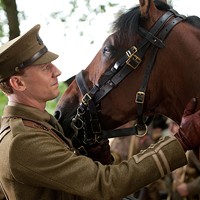Within the space of less than six months, I experienced a pair of highly unusual East Coast earthquakes. The first came last August, down here in my hometown, with the unnerving rattling of porcelain as I sat in my bathroom. The second was when my wife Sue and I came to New York last month for our annual performing arts pilgrimage and found a Broadway that had been stood on its head. Not a single new American musical – or a British import – that had opened since Labor Day was still running. Count Bonnie and Clyde as the most colossal casualty.
New American plays, on the other hand, have a new lease on life. Except for War Horse, last season's Tony Award winner, all five of the plays we saw this February opened this season, representing a new high-water mark for Broadway plays included in our round-up. We filled out our six-show Broadway lineup with Spider-Man Turn Off the Dark 5.0, reasoning that, after four postponed openings and a humongous $2.941 million holiday week at the box office, the producers and creative team must have gotten something right.
Off-Broadway, our refuge in past years for new comedies and dramas, continued to nourish us with more edgy and risqué fare. Here's what we saw and how I saw it, beginning with theatre this week and following up with opera, jazz, and ballet when I catch my breath:
Broadway
Other Desert Cities (**** out of 4) – At the Wyeths' spacious ranch in Palm Springs, youngest daughter Brooke wends her way back from the East for the Christmas holidays after a six-year absence. During that time, she has suffered a nervous collapse and completed her first book, a soon-to-be published memoir that she hasn't told her mom and dad about. For good reason: the memoir centers on the relationship between Brooke's parents and their son Henry, who committed suicide instead of facing the consequences of being involved in a murder by a terrorist group opposed to the Vietnam War. Lyman and Polly aren't exactly modeled on Ronald and Mommy Reagan, but they're darn close. Lyman was an ambassador under Ronny and Polly remains on a first-name basis with Nancy.
Brooke isn't painting a pretty picture, and it's 2004, an election year with Republicans still ruling the roost. Younger brother Trip, a TV producer, leans toward the more openly rebellious Brooke politically but also sympathizes with Mom and Dad's desire to keep the peace. Completing the family gathering is Polly's sister, Silda Grauman, a soused reminder of Polly's humble non-country club Jewish origins – and a constant goad with her liberal politics.
The star-studded cast, directed by Joe Mantello, meshes beautifully. Stockard Channing's sangfroid as Polly nearly equals Hellman's Regina Giddens (a role Channing has played in The Little Foxes), almost too intense for the West Coast and the denouement. Stacy Keach, on the other hand, seemed curiously slick and enervated as Ambassador Wyeth – until his volcanic Act 2 explosion had me trembling. Judith Light as Silda is equally telling, often comically, deftly balancing the gadfly's piercing frankness with her sloshed weaknesses.
Two HBO stars ably handle the younger generation, Rachel Griffiths (Six Feet Under) as Brooke and Justin Kirk (Angels in America) as Trip. Neutrality be damned, Kirk has a wonderful monologue when asked to adjudicate the whole political-generational brouhaha. They all do in Jon Robin Baitz's pointed, plain-dealing script, with Griffiths getting the final say in a nicely matured 2010 epilogue. By the time she's done, we have seen a microcosm of the impassioned, polarized, and damaged nation we have become. We've also glimpsed the bumpy road that took us here from the quagmire of Vietnam.
War Horse (***3/4) – Brilliantly adapted for the stage by Nick Stafford from the Michael Morpurgo novel, this National Theatre import was by far Sue's favorite show on our 2012 trip. If you're thinking about a family outing at a Broadway show, this Lincoln Center presentation at the Vivian Beaumont is clearly your top choice. The story handsomely straddles World War I, introducing us to Devonshire lad Albert Narracott – winsomely played by Andrew Durand – and his beloved horse Joey, who is sold to the English cavalry by Albert's drunken dad to serve in France, a virtual death sentence. While 10 million soldiers were slain in "The War to end all wars," eight million conscripted horses were heaped onto the carnage, often dying horrifically under machine gun fire or galloping into barbed-wire fences.
Albert's quest to rescue Joey from the Western Front is truly epic stuff, but it's the simulation of the horses, in lifesize puppets created by the Handspring Puppet Company and manipulated by three-person teams directed by Tony Sedgwick, that makes this a truly unforgettable theatre experience. Our hearts are with Albert as he seeks to track down his closest confidant, but we're more intensely invested in Joey (the narrator of the novel) from the moment we first meet him as a foal. After watching him grow close to Albert, expressing his loyalty by learning to pull a plow, we follow him on an odyssey that takes him from the British army to the German army and back – with an idyllic sojourn on a French farm before he's snared by a barbed-wire fence in No Man's Land.



